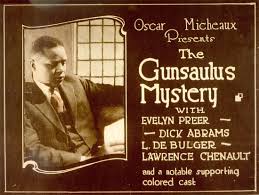Oscar Micheaux American Film Maker

Oscar Micheaux, American film maker, made his mark on American history as well as on American cinema {originally published at blackpast.org}.From South Dakota homesteader to Pullman porter to novelist to film maker…Oscar Micheaux was an American success story, his life and work embodying the traditionally American ideals of self-reliance, self-development and enterprise con gusto.
Hollywood’s negative view of ethnics and minorities
In its early days Hollywood portrayed ethnics and minorities in a less than favorable light, to say the least, and there was no counter force that could force it to do otherwise. It was a time when business owners could mow down striking workers with Gatling guns manned by government troops and the United States Senate was largely a political lobby whose main goal was to serve the interests of big business.
And then there was Oscar Micheaux.
lynching had already claimed the lives of hundreds of black people
Oscar Micheaux was black, born to a former slave at a time (the eighteen eighties) when the savage practice of lynching had already claimed the lives of hundreds of black people whose only crime was, in many (if not almost all) cases, to have been more successful in business than their white neighbors. Having spent much of his youth on a farm in southern Illinois, a Northern area that was heavily settled by southern whites and therefore ridden with the particularly virulent strain of racism that followed on the heels of the Reconstruction period – a period in which Northerners by and large abandoned the quest for and belief in racial equality that had impelled so many of them and their parents to take up arms against the Southern slavocracy in 1861.
Novelist, film-maker and relentless self-promoter
A gifted writer, Micheaux peddled his writings door-to-door among his mostly white South Dakota neighboring farmers. Oscar Micheaux was the quintessential self-made man. Novelist, film-maker and relentless self-promoter, Micheaux was born on a farm near Murphysboro, Illinois. He worked briefly as a Pullman porter and then in 1904 homesteaded nearly 500 acres of land near the Rosebud Sioux Indian Reservation in South Dakota. Micheaux published novels in Nebraska and New York and made movies in Chicago and Los Angeles.
Micheaux left “autobiographical” records in his first three novels, The Conquest (1913), The Forged Note (1915) and The Homesteader (1917), in which his protagonists play out a young black man’s life in rural, white South Dakota. Micheaux began his career with door-to-door sales of his early writings to neighboring farmers. Encouraged by the modest success from his first novel, Micheaux gave up farming to write six other novels about this period and region. D.W. Griffith’s powerful and vitriolically anti-black movie The Birth of a Nation ironically impressed upon Michaeux the ability of a filmmaker to tell a complex, multi-character story every bit as compelling as a novel.
